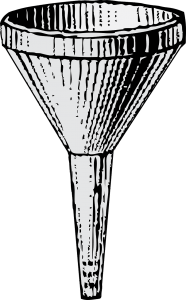Leads or Relationships: which are more important?
Should small businesses focus on ‘filling the sales funnel’, or on building relationships and letting Leads take care of themselves?
Leads, prospects, suspects, opportunities, potentials… there are so many ways to describe what is commonly referred to as how you ‘fill the sales funnel’.
Different people use different terms. Personally I’m not fond of ‘suspects’; it sounds too much like they’ve been in trouble! I’ve found ‘Leads’ to be the best, most broadly understood, term. Most people understand that a Lead is someone that has shown interest in the service that you offer or the products that you’re selling. A person who leads onto a sale and someone you enjoy a happy business relationship with.
Obviously I’m writing this from the angle of being a service provider or a business that sells products without an automated process or an eCommerce store, (i.e. when there’s a human interaction of some sort). The subject of generating Leads is a whole different conversation when an automated process is in place.
It also depends what part of your sales process you are referring to. The typical process goes as follows:
- Lead/Suspect – early interest (first stage, cool, warm or hot Leads)
- Prospect – very hot Lead, perhaps quoted at this stage
- Opportunity/Potential – the estimated sale amount with
But are we selling? Are we looking for Leads? I guess it depends on your perspective. We could go totally impersonal and say that we have to fill the top of our funnel with as many Leads as possible so that we get a reasonable level of Prospects based on an estimated ‘conversion rate’. There’s another term… ‘conversion’; this means the level of people that have moved through the process from Lead to Prospect (for example).
Realistically, small businesses that don’t automate their Lead generation process (e.g. through regular online advertising) aren’t going to be filling any sort of funnel.
That’s not to say that we shouldn’t be tracking our relationships and assigning some sort of ‘stage’ to the relationships that we are building. This actually makes the tracking even more important. Every little detail is valuable, building relationships are key. Those relationships aren’t always for sales either. We should also be tracking ‘Lead relationships’ that could turn into valuable collaboration partners or suppliers.
 Dare we call it a ‘Sales Pipeline’? Yes, but this doesn’t have a great fit with the majority of small businesses, especially micro businesses. We much prefer looking at this as a journey. The most effective way to look at this is through your customers’ eyes, go on their journey with you – right from the beginning when they were a Lead. We learnt this most valuable lesson from Simply Customer Ltd, specialists in Customer Journey Mapping.
Dare we call it a ‘Sales Pipeline’? Yes, but this doesn’t have a great fit with the majority of small businesses, especially micro businesses. We much prefer looking at this as a journey. The most effective way to look at this is through your customers’ eyes, go on their journey with you – right from the beginning when they were a Lead. We learnt this most valuable lesson from Simply Customer Ltd, specialists in Customer Journey Mapping.
Do you want more people to be interested in the product or service that you have to offer? Then start thinking about the type of person you see buying your product or service and get out there to find those kinds of people. You can call this your avatar but this can appear a bit impersonal.
For me it’s a simple equation Lead = Interested Person (emphasis on person). Focus on the relationships and the Leads work themselves out.
Final tip: Don’t be tempted to chase every single Lead, think it through first. Are they the right customer for you?
Often we don’t think of it that way and that is fundamental to you attracting the right kinds of customers on an ongoing basis.
Keep it personal but track it well!

